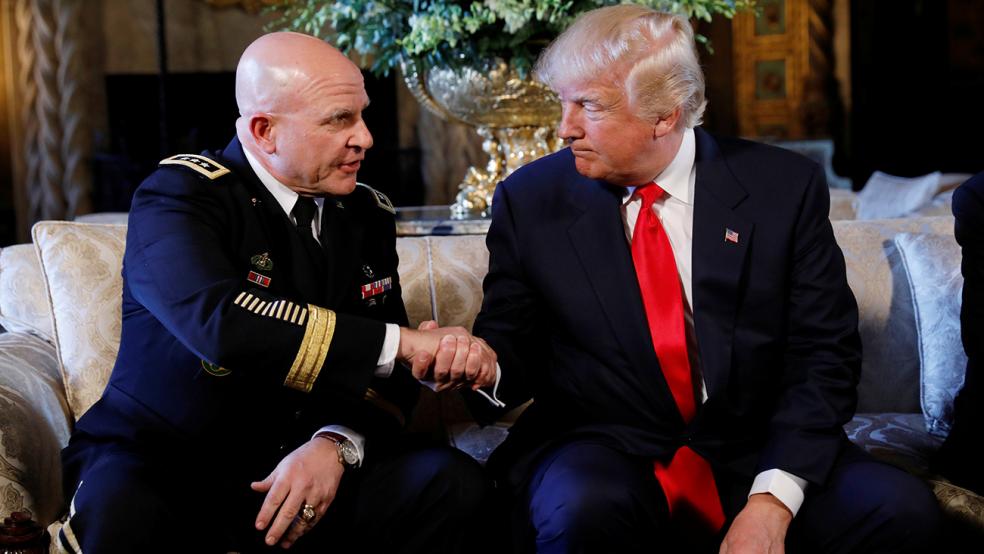When it comes to surrogates with a high level of credibility, the Trump White House arsenal is all but empty. Press Secretary Sean Spicer and White House Chief of Staff Reince Priebus have defended so many indefensible presidential statements in recent months that their public statements are hard to take at face value. Presidential Counselor Kellyanne Conway has all but disappeared from television after months of fact-challenged statements that led news organization to lose trust in her.
On Sunday, though, the White House rolled out its two remaining big guns, National Security Adviser H.R. McMaster and Secretary of State Rex Tillerson, to back up the administration’s explanation for comments the president made about former Federal Bureau of Investigation director James Comey while meeting with top Russian diplomats.
Related: Trump’s Big Problem: He Doesn’t Understand the Rules of the DC Game
The New York Times reported on Friday that In an Oval Office meeting the day after he fired Comey, Trump told Foreign Minister Sergey Lavrov and Ambassador Sergey Kislyak, “I just fired the head of the FBI. He was crazy, a real nut job. I faced great pressure because of Russia. That's taken off.”
Since last summer, Comey’s agency had been conducting an investigation into whether or not Trump’s campaign had illicit contact with the Russian government during his battle against Democrat Hillary Clinton for the presidency last fall. The FBI and the broader intelligence community have determined that the Russian government interfered in the election by orchestrating the release of embarrassing emails meant to damage Clinton’s campaign and to aid Trump.
Trump has angrily denounced the investigation as a “witch hunt” and said in a taped interview with NBC’s Lester Holt that he had the Russia investigation in mind when he fired Comey. That, combined with the revelation that he viewed the firing as removing “great pressure” on him leads to a pretty unmistakable conclusion that the president viewed getting rid of the FBI director as a way to beat back an investigation that he didn’t like.
Then, the spinning began. The White House released a statement on Friday insisting that Trump had felt it was necessary to fire Comey in order to pursue better relations with Russia.
Related: The Trump-Russia Investigation Could Clog Up DC for Years
“The President has always emphasized the importance of making deals with Russia as it relates to Syria, Ukraine, defeating ISIS and other key issues for the benefit and safety of the American people,” the statement said. “By grandstanding and politicizing the investigation into Russia's actions, James Comey created unnecessary pressure on our ability to engage and negotiate with Russia.”
The explanation stretches credulity to the breaking point. Trump, in all his complaining about the investigation and how badly he was being treated, does not seem to have ever claimed that his objections were related to its impact on his diplomatic relations with Russia. In the transcript of his discussion with Holt, in which Trump discussed the investigation at length, the issue doesn’t arise at all.
So it should indicate just how seriously the White house is taking the fallout from The Times report that the administration sent out McMaster and Tillerson on Sunday to defend this flimsy talking point.
“Well, I don't remember exactly what the president said,” McMaster told ABC’s This Week. “And the notes that they apparently have, I do not think are a direct transcript. But the gist of the conversation was that the president feels as if he is hamstrung in his ability to work with Russia to find areas of cooperation because this has been obviously so much in the news. And that was the intention of that portion of that conversation.”
Related: Will Trump Be Impeached? Online Bets Assess the Odds
On Fox News Sunday, host Chris Wallace asked Tillerson if Trump was “telling the Russians that firing Comey was taking off legal and political pressure?”
“Chris, that’s not my interpretation, certainly, of the conversation,” he said. “And I think what the president was trying to convey to the Russians is, look, I’m not going to be distracted by this -- all these issues that are here at home, they -- that, you know, affect us domestically.
“I’m not going to let that distract from our efforts to see if we can engage with you, engage with Russia, and identify areas where we might be able to work together. The president I think reemphasized the message to the Russians that the relationship is at a low point and we need to change that, we need to both work towards trying to improve that.”
There are those that will accept the White House line as the truth, but many -- perhaps most -- see an ex-post facto justification for another inadvertent admission by the president that he moved against the FBI director in order to (unsuccessfully) quash an investigation that was making him uncomfortable.
Related: Trump’s First Budget Is Coming, and the Spending Cuts Are Severe
Credibility is a limited resource, and as Spicer, Priebus and Conway have learned, Trump surrogates have to spend it like sailors on shore leave. McMaster, a decorated Army general, and Tillerson, the former CEO of ExxonMobil, arguably came into the administration with larger reservoirs of it than most of the administration’s other high-profile talking heads.
It will be interesting, and sad, to see just how quickly defending Trump leaves them tapped dry, as well.





